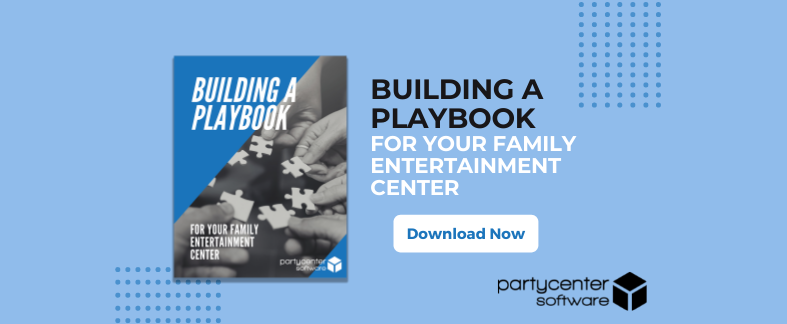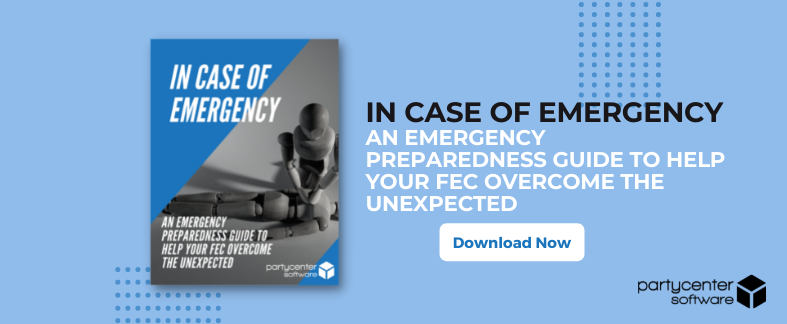Is your staff trained on how to deal with difficult customers or how to minimize customer conflict at your FEC?
As a FEC owner or operator, you want your staff to excel in customer service. It’s your top priority to offer a great experience and keep customers coming back.
However, it’s inevitable that at some point your staff will have to effectively resolve a customer conflict and it’s just as important to make sure that they know what to do and how to do it.
5 Tips on How to Train Your Staff to Deal with Conflict at Your FEC
Even businesses with the best service or experience have the occasional run-in with an unhappy customer.
That’s why it’s important to train your staff on how to deal with these situations when they arise.
Here are 5 tips on what you can do as a business owner or operator and what to include into your training manual or playbook for your staff.

1. Establish rules & guidelines
As an FEC owner or operator, it’s critical that you set clear expectations for your staff and your customers so that nothing is left open to interpretation.
General facility, behavioral, and safety rules should exist under the “Policies” tab on your website and should also be posted up in different areas of your facility, such as near attractions or entryways. Be sure to also create policies for your staff to follow and ensure that they’re aware what’s allowed and what isn’t.
You may want to consider including a section in your digital waiver where customers must agree to follow facility rules. This will be especially helpful if you have to confront a guest adamantly resistant to following the rules because you’ll have written proof and a signed agreement from them to back you up!
2. Train your staff to remain vigilant
Teach your staff to spot any red flags, such as unsafe behaviors on attractions or when someone isn’t following your dress code guidelines.
Being able to read an individual’s body language or facial expressions is also an important awareness skill that can help your staff de-escalate a situation. Have them look for crossed arms, unhappy expressions, and gestures pointing towards your attractions, food and beverage area, your front desk area, or even specific employees. If you or your staff see any of these behaviors during a guest’s visit, you might want to pay closer attention.
3. Train your staff to be proactive
Train your staff to be proactive in all situations and especially if they notice any red flags. You may even want to assign a staff member to spend time walking around your facility and check in with guests. Give them permission to improve customer experience and meet customer needs wherever possible.
Being proactive can help your staff prevent conflict from escalating. Be sure that when dealing with customers, they listen and remain calm. If one of your staff members manages your social media accounts, make sure that they also listen to customer feedback, even when it’s negative, and stay calm. Don’t encourage deleting negative comments, instead, ask that they apologize and offer a way to make things right.
4. Let your staff know it’s okay to ask for help
Teach your staff to remain calm in every situation and to know that they can always ask for help.
For instance, if the conflict is spotted by a junior employee, make sure they’re trained to notify a member of the management team as soon as possible. Be sure to have a member of management or a security guard present at your facility at all times.
If it becomes clear that a situation isn’t going to be resolved in a calm and timely fashion, you may have to kindly ask the involved parties to leave and escort them out. To protect your facility from any possible legal action, make sure your staff knows to never physically touch a customer when escorting them out or attempting to calm them down.
In the event this doesn’t work—if the situation escalates beyond “talking” and you or your staff member feels uncomfortable—it’s time to take a more radical approach. Consider having a code word or phrase in place for these types of situations so other staff members can help out and call the police if necessary.

5. Debrief with your staff and document any new protocols in your playbook
Any conflict at your FEC can be a learning experience for you and your staff. Make sure that you develop a post-incident procedure for you and your staff to follow.
For instance, if the police are called, you may want to obtain a copy of the police report and even create your own incident report to note down what happened and how the conflict was resolved.
Depending on the severity of the situation, you’ll likely need to make a decision (and policy) on whether or not these guests are going to be allowed back to your facility. Will you require them to wait a certain amount of time before they can come back, or are they no longer welcomed in your facility?
Make a decision sooner rather than later, and make sure it's communicated to the involved guests, your staff, and the authorities if needed. Include images of what the individuals look like, so they can easily spot them. Make sure you have both digital and hard copies of the completed incident forms so they can be kept on record if needed.
If anything was damaged or anyone was hurt, make sure to contact your insurance as soon as possible and have the hurt individual be taken care of, get medical attention for, or have them seek medical attention ASAP.
Be sure to take as many detailed pictures of any damage to people or equipment/your facility as possible, to prove to insurance and other legal groups if necessary.
Below are a few links to various report templates you may need. These will give you a general idea of the proper documentation you should prioritize obtaining, should the situation call for it.
It’s very important to remember that when a dramatic incident takes place, it can distract your employees, and prevent them from performing to the best of their ability.
Shortly after the situation has subsided, hold a quick team meeting. Acknowledge what happened and that you’ll make sure it’s properly addressed. Thank your team for being proactive and make sure that if anyone needs to talk, they know that your door is always open.
Make sure that you:
- Ask your team members how they feel, and if there is anything further you should know.
- Ask if there was anything they think should or could have been done differently to have made the situation better, or that could have eliminated the incident from escalating all together.
- Make sure your staff understands how an incident similar to the one that occurred should be handled if it happens again in the future.
- Commend any and all of your staff members that were involved in the situation for handling it so well. Appreciation goes a long way with your employees!
- Take notes during the debrief session so that you can update any documentation in the future.
Edit and tweak your prevention and de-escalation process when new lessons are learned and make sure that any employee handbooks, your company playbook, and other procedural documentation is updated with necessary changes. These updates should also be reflected in any new employee training or refresher training sessions for veteran employees.
Comment Below!
What did you think of the 5 tips we shared in this post? Let us know in the comment section below!
Upcoming Webinar
What factors affect the legality of waivers? How do your waivers stand up in court? As a business owner, it’s important to stay informed and know your rights.
In this webinar, you will learn from legal expert Michael L. Amaro of Amaro Baldwin LLP, who has represented clients in the amusement, sports, recreation, and leisure industries and is a founding member of the International Amusement and Leisure Defense Association.
Click on the image below to register for this webinar!

Let's Connect!
We want to connect with you on social media so we can serve you best. Follow us on Facebook, Instagram, Twitter, and LinkedIn, and we'll follow you back!
